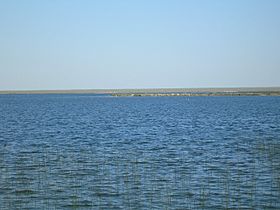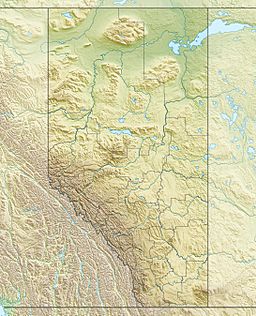Lake Newell facts for kids
Quick facts for kids Lake Newell |
|
|---|---|

Lake Newell from Kinbrook Provincial Park
|
|
| Location | County of Newell, Alberta |
| Coordinates | 50°26′04″N 111°56′06″W / 50.43444°N 111.93500°W |
| Type | Reservoir |
| Primary outflows | Rolling Hills Lake, Bow River |
| Catchment area | 84.6 km2 (32.7 sq mi) |
| Basin countries | Canada |
| Max. length | 14 kilometres (8.7 mi) |
| Max. width | 6.5 kilometres (4.0 mi) |
| Surface area | 66.4 km2 (25.6 sq mi) |
| Average depth | 4.8 metres (16 ft) |
| Max. depth | 19.8 metres (65 ft) |
| Surface elevation | 765 metres (2,510 ft) |
Lake Newell is a very large man-made lake, also known as a reservoir. It is located in southern Alberta, Canada. You can find it about 14 kilometers (9 miles) south of the city of Brooks.
All About Lake Newell
Lake Newell is a huge body of water that was created by people. It was formed in 1914 when the Bassano Dam was built. This dam helped to fill the area with water. The lake was named after T.H. Newell, who was an expert in how to water land for farming. The area around the lake, called the County of Newell, is also named after the lake.
Size and Depth
Lake Newell covers a big area of about 66.4 square kilometers (25.6 square miles). It's not a very deep lake, with an average depth of about 4.8 meters (16 feet). However, in some spots, it can reach a maximum depth of 19.8 meters (65 feet). The lake sits at an elevation of 765 meters (2,510 feet) above sea level.
Water Flow and Use
The water from Lake Newell eventually flows into the Bow River. Before reaching the Bow River, it passes through Rolling Hills Lake. This lake is like an extension of Lake Newell and was filled when the dam was made taller in 1939.
Many special channels, called irrigation canals, are built around Lake Newell. These canals help move water from the lake to farms. This is very important for growing crops in the dry areas north and east of the lake.
Nearby Attractions
Next to Lake Newell, you'll find two wetlands that were also created by people. They are called Kinbrook Marsh North and Kinbrook Marsh South. These areas are important for wildlife.
On the eastern side of the lake, there is a popular place called Kinbrook Island Provincial Park. This park was created on November 14, 1951, and is a great spot for people to enjoy the lake and nature.
 | Calvin Brent |
 | Walter T. Bailey |
 | Martha Cassell Thompson |
 | Alberta Jeannette Cassell |


